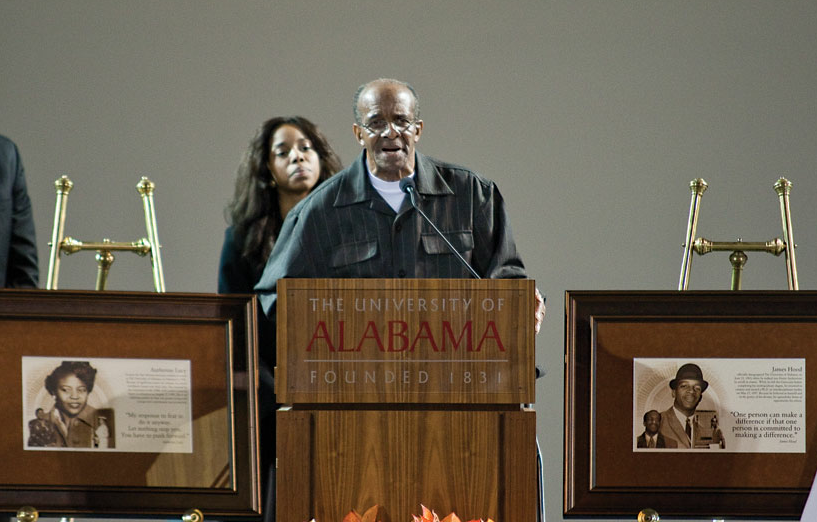James Hood, who became the first black man enrolled at The University of Alabama in 1963, wrote this guest editorial in the Crimson White on June 27, 1963, 16 days after George Wallace’s Stand in the Schoolhouse Door. The editorial in The Birmingham News ran on the same day. The current editorial staff of The Crimson White made no changes for this publication.
Needed: More Students, Less Pickets
By James Hood
As a result of a recent experience in my life, I have taken a careful look at race relations, and have concluded that the protest movements have resulted in, literally, a big unnecessary mess.
With our nation on the brink of racial violence there is a firm need for a solution which will not only meet the demands of the Negro, but also will make him meet the demands of society. In order for one to be accepted in a society he must meet certain standards and possess certain values in accordance with that society in which he is seeking a position.
He must not only seek to get into that society, but also he must have something to offer it. He must upgrade the status of that society by becoming part of it.
I am a Negro. I was born in the “Old South” as it is sometimes called. I was educated in the schools of the South, and have begun to pursue higher education in the South. Therefore I feel that I am in a position to discuss this problem and what I see as its ultimate solution.
Because of today’s protest movements I feel compelled to take a position and support that position by logical argumentation. I have made a careful study of three major organizations which are primary stimuli in racial protest. I would like to hold up three points of interest which I feel will illustrate what I am about to propose.
First, the leadership of these organizations is composed of learned men, who have achieved fame outside civil rights. Second, the bulk of the people involved in the organizations are students and uneducated people. Third, these organizations thrive on conflict, and thus, will continue to exist as long as they are able to instigate conflict.
My point is this: basically, I think the whole idea of protest has gotten off course. I think it has become a matter of excitement rather than conviction for most Negroes.
Why doesn’t the Negro race wake up and go about this thing in a more intelligent way? (The answer to that comes with these questions: Who benefits from conflict—the Negro masses or the Negro leaders? Who would lose prestige and money if another way were chosen?)
There must be some more positive way of achieving first class citizenship, a way without violence and protest. I think there is. It is the same method employed to increase the standards of a community; the same system which assures one of the implantation of ideas. By now you have guessed the answer—Education.
The protest movements should be centered around educational objectives, rather than immediate social and economic objectives such as sit-ins, lie-ins, swim-ins, etc.
It is my firm belief that through the process of education the sit-ins and swim-ins will be unnecessary. There must be more time spent in the classroom and less time wasted on picket lines.
My solution to the problem is a long range one, but I am confident it will resolve the individual differences of both races, and stabilize relationships between the opposing forces.
Inasmuch as I propose a solution frowned upon by the majority of my race, I feel that many people will consider my idea weird. However, everyone has a right to his opinions and does not have to fear being harmed for standing firmly by them. My position will make me unpopular with the masses of my people, but that has no relevance in what I believe and how I feel about the situation.
I honestly believe the big “unnecessary mess” in which the protest movements have resulted can be solved in the classroom. But, education itself will not and cannot occur overnight. It demands the tough of the toughest and the concern of the concerned. It is not a one-way affair, but a two-way street on which both parties must travel at the same rate of speed, and in pursuit of the same destination, if there is to be harmony at the traffic light. (C.)









